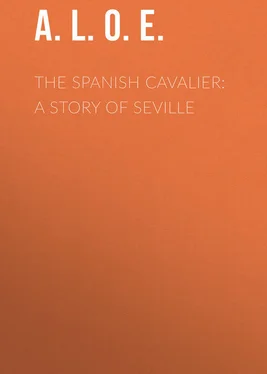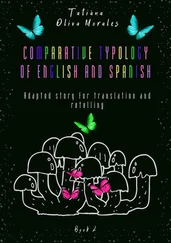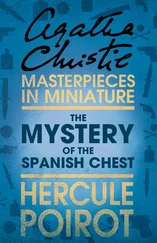A. L. O. E. - The Spanish Cavalier - A Story of Seville
Здесь есть возможность читать онлайн «A. L. O. E. - The Spanish Cavalier - A Story of Seville» — ознакомительный отрывок электронной книги совершенно бесплатно, а после прочтения отрывка купить полную версию. В некоторых случаях можно слушать аудио, скачать через торрент в формате fb2 и присутствует краткое содержание. Жанр: foreign_antique, foreign_prose, на английском языке. Описание произведения, (предисловие) а так же отзывы посетителей доступны на портале библиотеки ЛибКат.
- Название:The Spanish Cavalier: A Story of Seville
- Автор:
- Жанр:
- Год:неизвестен
- ISBN:нет данных
- Рейтинг книги:3 / 5. Голосов: 1
-
Избранное:Добавить в избранное
- Отзывы:
-
Ваша оценка:
- 60
- 1
- 2
- 3
- 4
- 5
The Spanish Cavalier: A Story of Seville: краткое содержание, описание и аннотация
Предлагаем к чтению аннотацию, описание, краткое содержание или предисловие (зависит от того, что написал сам автор книги «The Spanish Cavalier: A Story of Seville»). Если вы не нашли необходимую информацию о книге — напишите в комментариях, мы постараемся отыскать её.
The Spanish Cavalier: A Story of Seville — читать онлайн ознакомительный отрывок
Ниже представлен текст книги, разбитый по страницам. Система сохранения места последней прочитанной страницы, позволяет с удобством читать онлайн бесплатно книгу «The Spanish Cavalier: A Story of Seville», без необходимости каждый раз заново искать на чём Вы остановились. Поставьте закладку, и сможете в любой момент перейти на страницу, на которой закончили чтение.
Интервал:
Закладка:
The eye was not the only sense that drank in delight. The air was fragrant with the perfume from orange-trees, and musical with the peal of bells from the summit of the Giralda, blending softly with the nearer sound of a Spanish song, sung in rich tones to the accompaniment of a guitar.
"What a glorious city is this Seville!" said Lucius to himself as he went on his way. "There is not an object on which the eye rests in which an artist would not find a subject for a sketch. What a picture might be made of yonder donnas, with their mantillas and graceful lace veils, as, accompanied by their duenna, they ascend the steps of that magnificent church! No women are lovelier than those of Seville, – long may they keep their graceful costume! How picturesque is yon group of gipsies by the fountain – the man in his striped mantle of many hues leaning over the back of his ass, as he talks to the dark-eyed girl with scarlet blossoms wreathed in her raven-black hair! The very beggars wear their rags with grace! And what thoughts of the past crowd upon the mind in this old city of the Moors! Yes, what thoughts of the past!" repeated Lucius to himself, while a sterner expression marked his features; for he had now reached a spot associated with memories of the Inquisition, which had held its headquarters at Seville. Again Lucius paused, but it was not now to admire, and it was before the mind's eye that a picture of thrilling interest arose.
"Do I indeed stand on the very spot where, a few centuries ago, thousands of martyrs yielded their bodies to the flames, their souls to their God?" 3 3 It is said that in the year 1461, when the Inquisition was established in Seville, it sacrificed two thousand victims; and that from the same date to 1517, twelve thousand were burned alive.
mused Lepine. "Was it here that – clad in their yellow san-benitos, 4 4 A garment, covered with representations of demons, worn by the condemned.
and surrounded by curious crowds to whom their pangs were a pastime, and fanatical priests to whom their torments were a triumph – men and tender women endured the most painful of deaths! Yes; this pure balmy air was once polluted with the smoke from human sacrifices – this sunshine darkened with the clouds rising from stakes to which living victims were bound! What deeds of heroism – what unblenching courage – what unshaken faith displayed in the hour of nature's agony, have made this spot holy ground! Here – a spectacle to angels and to men – martyrs showed what the sons of Spain could dare and her daughters endure! Are the idle, self-indulgent inhabitants of Seville in the nineteenth century descendants or representatives of heroes who counted not their lives dear to them, but who, having embraced evangelical truth, grasped it firmly even unto death? Or can it be that martyrs have suffered in vain – that the light which they kindled is quenched for ever in Spain? Is the cry, 'How long, Lord, how long?' never to meet an answer as regards this benighted though beautiful land? I cannot believe it;" and Lucius resumed his rapid walk. "The seed sown amidst tears and blood must spring up one day, and ripen to a harvest of light! Happy – thrice happy – the reapers! Spaniards will show themselves worthy of their martyrs, and no longer appear to the world as a degenerate race, indifferent to their highest interests, or cold in the holiest cause. But what right have I to upbraid them either with indifference or coldness? Here am I, proud of the name of Englishman, thankful for having been brought up in the clearness of gospel light. I have been for a year in Seville, and I have never so much as shown to a Spaniard the New Testament in his own language, which I carry now on my person. Nay, the only man in this country for whom I have a feeling of friendship – the man whom I meet almost every day of my life – he knows nothing of the faith which I hold, save that he probably deems me a heretic, simply because I was reared in England. Of Alcala's inner life, his views, his hopes, I, his friend, am as ignorant as if we had never met till to-day! I cannot tell – I have never inquired – whether De Aguilera be a bigoted son of that Church which is drunken with the blood of the saints, or whether, like many of his countrymen, he has adopted sceptical views, the pendulum swinging from superstition into infidelity – from believing that which is false, into denying that which is true.
"And the Spaniard may now be on the eve of meeting a violent death – of having the martyr's agonies without the martyr's crown! I have been made uneasy by the bare rumour of the danger to which his person may be exposed. How little have I thought of the perils which surround the soul of one brought up under the dark shadow of Romish error! I must see De Aguilera, and speak to my friend as I have not ventured to speak before. God help me to break through a reserve which I have often suspected to be cowardly, but which I now feel to be criminal!"
CHAPTER III.
FADED SPLENDOUR
Is this a prison or a palace?" was the mental inquiry of Lucius, as, after again asking his way to the house of Don Alcala de Aguilera, he reached the stately building, which was one of the numerous relics which the Moors have left behind them in Seville. The high, dead, fortress-like wall, suggested the former term; a glimpse through the open archway of the dwelling, the latter. From this archway a vestibule led into an inner court, from which it was divided by an ornamental grating; this grating also being open at the time, nothing impeded the view into the marble-paved patio beyond. This patio, or court, was surrounded by clustering columns of the most graceful proportions; while in the centre of it orange-trees and broad-leaved bananas, the oleander and the myrtle, bordered a fountain of exquisite design. The vestibule itself was paved with Moorish tiles, of hue the most brilliant; and the exterior of the archway was gracefully sculptured. The first impression made by a glance through the opening was, that a scene of Oriental beauty and splendour lay beyond it. Had Lucius had time for closer observation, he must have noticed also marks of poverty and decay. Every here and there a bright tile in the passage, and marble square in the patio, had been broken or displaced – the carving on the fountain had in many places been injured, and no water fell into its basin; but the plants in the little central garden looked fresh and green in the softened light, as if tended by a woman's hand. The aspect of the place, so unlike that of any mansion in a northern clime, was calculated to raise admiration and excite curiosity in the mind of a stranger, and waken a desire to explore the interior, and make acquaintance with the dwellers in so picturesque and romantic a home.
The appearance of the one whom Lucius saw at the entrance, however, contrasted with the stately elegance of the mansion of which she was an inmate. Chaffering with an itinerant vendor of fish stood an old woman, wrinkled and bent. From her coarse dress, arms bare to the elbow, and the strong scent of garlic which hung about her, the dame might rather have been deemed a denizen of one of the low purlieus of Seville, than the servant of an aristocrat. The old crone, who used much gesticulation in speaking, was so eager about her bargaining that she did not notice the approach of Lucius Lepine. The colloquy between her and the hawker had probably lasted for some time, as both parties looked heated and angry.
"Five cuartos a piece! why, I would not give twenty for the whole lot of them; they're not fresh – not fit to set before the señora!" were the first words heard by Lucius as he came up to the archway.
"I tell you again, they were alive and swimming this morning," interrupted the man.
"Don't you think I know good fish when I see them?" cried the shrill-voiced dame. "I who have been for nigh sixty years in the service of the illustrious caballero Don Pedro de Aguilera, his son, and his grandson besides!"
Читать дальшеИнтервал:
Закладка:
Похожие книги на «The Spanish Cavalier: A Story of Seville»
Представляем Вашему вниманию похожие книги на «The Spanish Cavalier: A Story of Seville» списком для выбора. Мы отобрали схожую по названию и смыслу литературу в надежде предоставить читателям больше вариантов отыскать новые, интересные, ещё непрочитанные произведения.
Обсуждение, отзывы о книге «The Spanish Cavalier: A Story of Seville» и просто собственные мнения читателей. Оставьте ваши комментарии, напишите, что Вы думаете о произведении, его смысле или главных героях. Укажите что конкретно понравилось, а что нет, и почему Вы так считаете.












